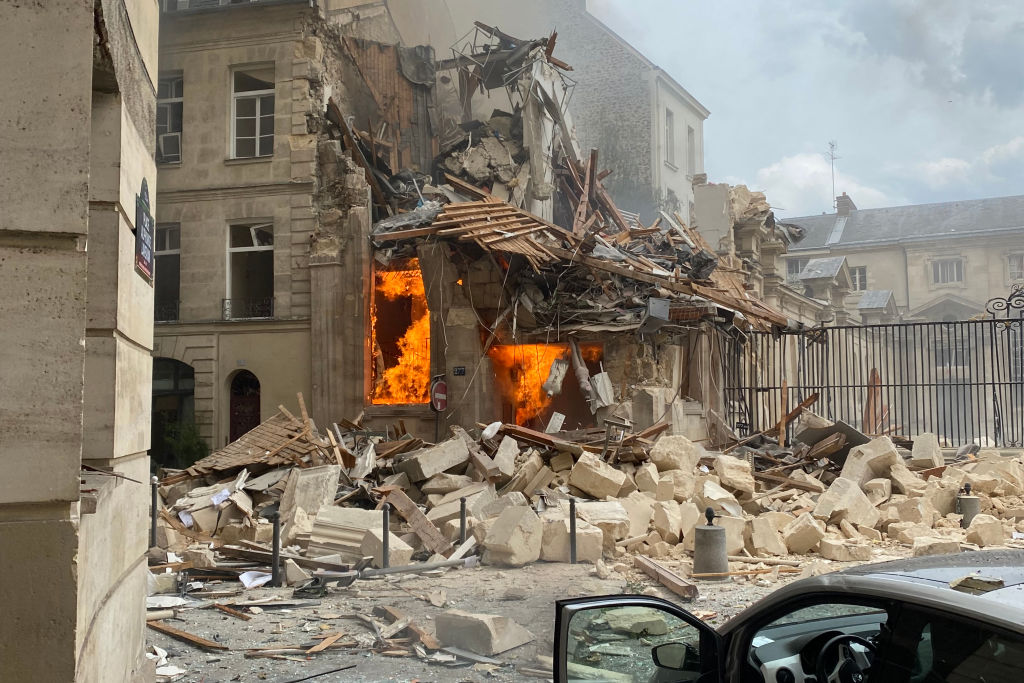Numerous heads of state from the third world are in Paris for a summit hosted by President Macron. The aim of the conference – or the Summit for a New Global Financing Pact to give it its full lofty name – is to ‘address the needs of developing countries in the fight against poverty.’
Is France, or indeed the rest of the West, in a position to dish out advice to developing nations?
The days of Europe being able to lecture developing countries about efficiency, integrity and prosperity are long gone.
It was bleakly ironic that on the eve of the summit Paris was rocked by a huge gas explosion that blew apart a building in the fifth arrondissement, injuring dozens of residents. It’s the second such incident in recent years. In 2019 four Parisians were killed when a gas leak detonated inside their building, prompting warnings from local politicians and fire service chiefs that the decrepit state of the 2,000km of gas piping was ‘the number one problem in Paris’.
One of those politicians, Alexandre Vesperini, expressed his regret after Wednesday’s explosion that the warnings had not been ‘particularly followed up’.
Paris is not the only French city to showing signs of its age; six people in Marseille lost their lives in April this year when their apartment block collapsed, reminiscent of an incident in the same city in 2018 when the number of fatalities was eight.
The tragedies are only one strand of a growing sentiment in France of a phenomenon known as ‘tiers-mondisation’ – Third Worldisation.
The alarm was sounded as long ago as 2010 by the historian Alain-Gérard Slama. In an op-ed for Le Figaro he predicted that not only France but all of Europe was in the process of ‘Third-Worldisation’. Writing in the wake of the 2008 financial crash, Slama asked ‘whether our old democracies, faced with an economic, sociological, demographic and intellectual shock unprecedented in the last 70 years, are in danger of evolving in a direction comparable… to the tribal and arbitrary model that is hampering the development of most Third World countries.’
The 2008 crash was just the first shock of many to strike the West, each one weakening further its foundations. The overthrow of Colonel Gaddafi in 2011 precipitated the first great migrant crisis, and Angela Merkel provoked the second four years later by opening Europe’s borders to more than a million migrants; Islamic terrorism has left hundreds dead; Covid lockdowns caused irreparable economic, mental and social damage; environmental obsessiveness is reawakening class divisions; progressive radicalism is stoking identitarian tensions and the war in Ukraine has sent energy prices and inflation soaring.
France is at the epicentre of these shockwaves, and a growing number of prominent thinkers and commentators are warning that culturally and economically the country is in grave danger. In a recent interview the economist Agnes Verdier Molinié cautioned that ‘France is on the verge of bankruptcy’ and that the annual cost of its debt will hit €70 billion in 2024. All the while the Republic’s core infrastructure – education, health, judiciary and transport – continue to degrade and, as Molinié said, more and more French are wondering why they are being so taxed so much for so little in return.
The problems are also mounting socially. Leaving aside the drug wars being fought on French streets, which so far this year have left more than 150 dead or wounded, and the persistent menace from Islamic extremists (this week two young men were arrested on suspicion of planning a terrorist attack), it’s the day to day violence that is most eroding the nation’s morale.
Violent crime has become so commonplace that only the most shocking incidents make the news: the murder of a teacher in her classroom, the stabbing of several toddlers in an Annecy playground this month, or the brutal assault on a pensioner and her seven-year-old granddaughter that was caught on camera in Bordeaux this week.
What’s true for France is true for Britain, a country that also feels like it is in terminal decline, beset by economic and social malaise. Many ambitious young people certainly think so, hence their emigration to Australia, New Zealand, Dubai or the States. In their stead come tens of thousands of young people from South-East Asia, the Middle East and Sub-Saharan Africa.
Many of these new arrivals are economic migrants, willing to put in the hours and the effort that young westerners no longer are. Absenteeism levels hit record levels in Britain and France last year, with Monday and Friday the days when workers were most often not to be seen. As a consequence productivity in both countries is falling; in Britain’s case growth in output per hour worked is forecast to average 0.25 per cent a year over the next three years, down from 2 per cent in the first decade of the century.
Europe’s apathy is matched only by its conceit. The days of the continent being able to lecture developing countries about efficiency, integrity and prosperity are long gone. And the West’s hypocrisy, double standards and, more recently, their embrace of progressive dogma that runs counter to the religious faith of most of the Third World, means that their moralising falls on deaf ears anyway. China and Russia are their new mentors.
In his 2005 book, The Fall of Rome and the End of Civilisation, the historian Bryan Ward-Perkins concluded with a warning for the West: ‘Romans before the fall were as certain as we are today that their world would continue for ever substantially unchanged. They were wrong. We would be wise not to repeat their complacency.’
But we are, and as a consequence Europe is heading for a very nasty fall.







Comments